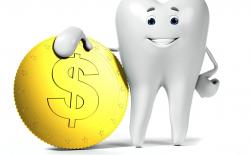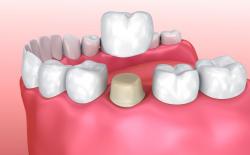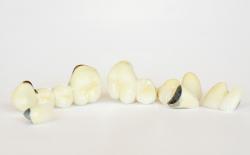What are the advantages of gold crowns?
Full gold crowns have many advantages - like perfect fit, long-lasting, tooth-saving - that makes them a great choice for tooth restoration. Most dentists like them, but they are not very popular among patients as they do not have much esthetic appeal.
They are suitable for back teeth like the molars, where they are not visible.
Gold dental crowns are especially recommended for patients who are in the habit of biting strong food substances along with clenching and grinding.
These are the most important advantages of gold crowns:
1. Better oral health
If you opt for a gold crown, you can save a lot of your tooth structure.
When you get a crown, your dentist files / trims your tooth so that it holds your crown. Your dentist can trim your tooth lesser if you get a gold crown. So, you will save more of your natural tooth structure, thus, you have better oral health.
2. Better overall health
Your body tolerates gold better than most other popular materials used for your dental treatment. So, you won't have any nerve problems or bleeding gums because of a gold crown. With the other metal crowns, some people experience these problems when their body cannot tolerate their crown well. Most people are not allergic to gold.
Gold crowns get especially useful as you age. With aging, you may develop allergies and may have reduced immunity. With gold, you have a smaller chance of allergic reactions or gum infections.
3. Long-lasting
Gold crowns are more durable than other crown types. So, they wear out lesser and you can use them for a longer time.
Did you know that your tooth responds to heat and cold with expansion and contraction? So is gold. The good news is that the expansion and contraction of gold are similar to that of your tooth. So, your gold crown does not crack/chip/fracture like some other crowns. The rate at which gold expands or contracts is like your natural tooth.
On average, you can have your gold crown for at least 20 to 40 years.
4. Perfect fit
Gold caps or castings fit more accurately on your tooth than the other dental restorations. Porcelain crowns tend to shrink, thus the fitting of the crown may change, and decay around your tooth might develop.
5. Does not harm your other teeth
When you chew food, your teeth in your upper and lower jaws come in contact and work together to chew the food. Few crowns tend to wear out your opposing tooth. Gold is safe and does not harm your opposing tooth. This property makes it ideal for bruxism.
Bruxism is a state wherein you grind your teeth excessively, especially at night. It can be so intense that it may wake up the person who is sleeping next to you. Bruxism damages your teeth as well as your crowns.
Gold is an ideal choice here as it neither harms your opposing teeth nor it lets your opposing teeth harm your gold crown.
6. Stays new always
Gold is smooth and does not get stained. Other crowns may have a rough surface which invites bacteria to settle down and stain your crown as well as increase the likelihood of infection.
A short video about the gold crown procedure. Duration: 1:25
Need a local dentist?
What are the disadvantages of gold crowns?
Gold crowns have two main disadvantages: price and esthetics. They are not extraordinarily expensive (cost like zirconia or e-max ceramic crowns), but their esthetic appeal makes them very unpopular among patients.
1. Gold crowns are expensive
As gold is an expensive metal, gold tooth crowns are expensive. (Even though gold crowns are not 100% gold, since the crown wouldn't be hard enough.)
However, as they are longer-lasting, they need lesser replacements or adjustments. You also need fewer appointments to adjust or replace a gold crown, thus, it will be saving you time and money in the long run.
2. Poor esthetics
Gold restorations look very different than your natural teeth, therefore they are simply just not an option for most patients.
The dental industry tries to overcome this drawback by combining gold with porcelain. The result is the porcelain fused to gold crown, which keeps most of the advantages of gold crowns but looks a lot more appealing.
In fact, in terms of quality and esthetics, porcelain fused to gold might be the ideal choice for back teeth restorations.
It's good to know, that when your dentist says porcelain fused to metal (PFM), the metal is not always gold. It might be some cheaper metal like silver or even nickel, which might cause allergic reactions in some cases.
If you are going to have a PFM crown, it's best to ask your dentist what metal will be used.
Gold crown in a dental lab.
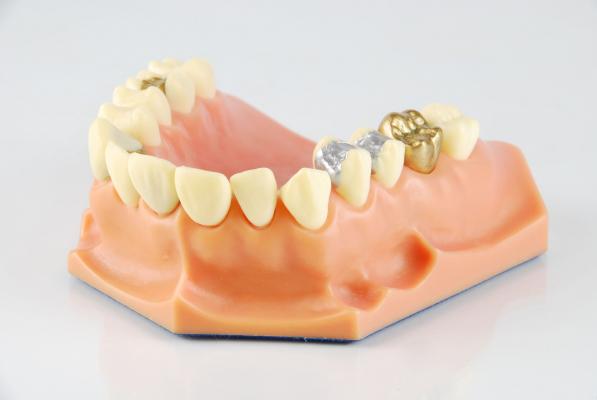
Porcelain fused to gold crowns
PFG or porcelain fused to gold is also an option especially for your front teeth.
A PFG crown has a gold base and porcelain on top of it. This gives you all the advantages of gold and porcelain and on top of it gives you the looks similar to your natural teeth.
However, the price is the same as that of gold crowns. So, for the front teeth, you may want to go for PFG crowns, and for your back teeth, you may want to opt for PFG or gold crowns.
You might also be interested in Captek crowns, which is high-quality porcelain fused to gold crown.
How much does a gold crown cost?
The price of a gold crown in the United States is around $1,000 - $1,500. Depending on a lot of factors, you might get a somewhat lower or a significantly higher quote from your dentist.
In the UK prices may start around £350. In Canada and Australia, the price is around the US price.
Since gold is an expensive material, the size of the crown will be an important factor in the final price. This makes estimating gold crown prices hard.
The price of porcelain fused to gold crowns is usually close to the full gold crown price.
Here is a rough estimate of gold crown prices in various countries:
- United States: $1,000 - $1,500
- United Kingdom: £350 - £700
- Canada: $1,000 - $1,500
- Australia: $1,000 - $1,500
Need a local dentist?
Gold crowns might be a good choice for back tooth restorations.
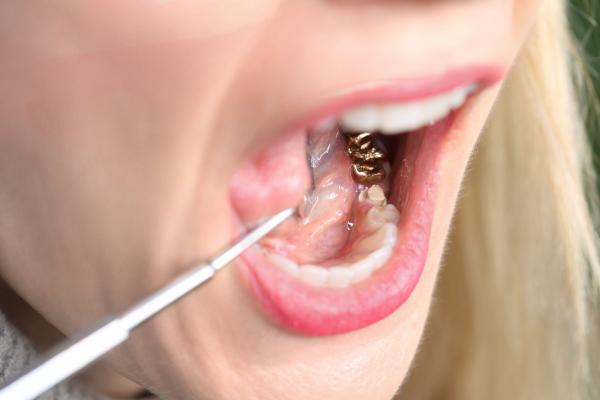
Forms of gold crowns
Gold crowns are available in three forms:
- Full gold crowns: They are made to cover up the whole tooth up to the gum line.
- Gold inlays: These are gold castings used to replace particularly those areas where a distinctive filling has to be placed.
- Gold onlays: They are equally strong as a full crown but need tooth width reduction and the edges do not touch the gum line.
Other dental uses of gold
You can also use gold for inlays and onlays.
An inlay is a lab-made restoration or filling.
Generally, when you have a decay/cavity, your dentist cleans the area, removes caries/decay, and prepares your tooth so as to hold the filling and places a filling.
In case of an inlay, the filling is lab-made. Your dentist cleans your tooth and glues a lab-made filling. Inlays need less trimming of your tooth; thus, they save your natural tooth and give you better oral health.
Onlay is also a lab-made filling. The difference between the inlay and onlay is, the inlay is a filling that covers only the biting surface of your tooth, while the onlay also covers the cusp - the part of your teeth which comes in contact with your opposing tooth.
As your body tolerates gold well, gold inlays and onlays suit you more than other fillings.
A short video about the gold content of gold crowns. Duration: 1:11.
Can you sell your gold dental crowns?
Yes. You can sell any of your dental prosthesis which has precious metals such as gold and platinum.
How much does my gold dental crown worth?
It depends on the composition. Gold crowns and other gold restorations such as bridges, inlays, and onlays are usually made up of 16-karat gold. However, sometimes you find crowns that use 10 karat/ 40% gold or 20 karat/ 80% gold.
16 karat gold is around 60% gold. They also have a combination of other metals such as platinum, silver, nickel, and chromium. This combination makes your gold crown soft enough to be molded into a crown and hard enough to use for the biting surface of your tooth. While calculating the worth of your gold crown, the buyer deducts a refining cost of 15 to 18% which he uses to extract the precious metals out of your gold crown. A gold crown is usually 1/10th of an ounce of 16-karat gold. It may fetch you around 60$ for each crown after deducting the 15 to 18% refining cost. The price of an old crown that you want to sell, depends on the size of your crown as well as the alloy/ metals and their composition used in making it.
Who buys your gold crowns?
As the price of gold is high since the past decade, a lot of people are interested in buying old dental prosthesis/restorations made of gold and other precious metals. A local jeweler, coin shop, or even a neighborhood dental lab may be a buyer.
However, refineries may pay you higher than the local buyers. Refineries do the metallurgical assay and will be able to pay you the right amount. The local buyers may just pay you an approximate price based on the weight of your prosthesis.
You can contact the refineries online as well as via phone or shipment. They generally have a free shipment as well as no minimum quantity. You can also add some old or broken gold jewelry that you are not using. In case you are not happy with the rate that refineries are offering you, you can get back the items you shipped as you have an option to reject the payout.
Selling gold dental crowns
Immediately transfer your gold prosthesis/restorations to a closed plastic bottle/pill bottle or a sealed plastic pouch (heavy duty.) Sometimes you may have a tooth removed that has a gold crown/bridge or any other restoration such as the inlay. You can send your gold restorations along with the extracted teeth. You don’t have to take the trouble of removing any attached cement or dental work attached to your gold crowns. Buyers know how to deal with them. They melt the gold crowns and separate out the precious metals which they need.
Frequently asked questions
Do dentists still do gold crowns?
Yes. Even though it's not common - because of the low esthetics -, gold is a great material and sometimes dentists recommend gold crowns for back teeth.
Which is cheaper gold or porcelain crowns?
Gold crowns are usually a bit more expensive, but the difference is not that big, so this should not be the decisive factor.
If your dentist recommends a gold crown over a porcelain crown, you should seriously consider it, even if the price is higher by a few hundred dollars.
How long do gold crowns last?
With proper care, gold crowns can last a lifetime.
The average lifespan of a dental crown is 5-15 years, but gold crowns tend to last significantly longer.
Need a local dentist?
You might also be interested in:
Dental Crowns Cost
The price of a dental crown depends on many factors. Read our article to find out more about what affects the cost of a dental crown.
How Long Do Dental Crowns Last?
Dental crowns usually last for about 5-15 years, however, in certain cases they can last a lot more.
Porcelain Fused to Metal Crowns
Porcelain fused to high noble metal crown is a good alternative to a pure gold crown. This crown has many of the benefits of a gold crown but looks more esthetic.
